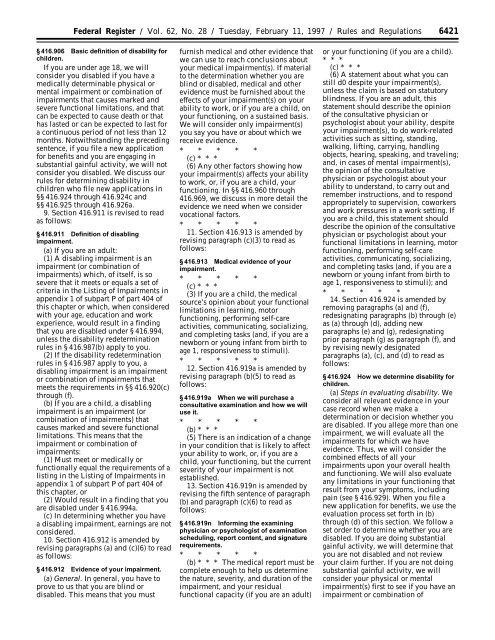federal register - U.S. Government Printing Office
federal register - U.S. Government Printing Office
federal register - U.S. Government Printing Office
Create successful ePaper yourself
Turn your PDF publications into a flip-book with our unique Google optimized e-Paper software.
Federal Register / Vol. 62, No. 28 / Tuesday, February 11, 1997 / Rules and Regulations6421§ 416.906 Basic definition of disability forchildren.If you are under age 18, we willconsider you disabled if you have amedically determinable physical ormental impairment or combination ofimpairments that causes marked andsevere functional limitations, and thatcan be expected to cause death or thathas lasted or can be expected to last fora continuous period of not less than 12months. Notwithstanding the precedingsentence, if you file a new applicationfor benefits and you are engaging insubstantial gainful activity, we will notconsider you disabled. We discuss ourrules for determining disability inchildren who file new applications in§§ 416.924 through 416.924c and§§ 416.925 through 416.926a.9. Section 416.911 is revised to readas follows:§ 416.911 Definition of disablingimpairment.(a) If you are an adult:(1) A disabling impairment is animpairment (or combination ofimpairments) which, of itself, is sosevere that it meets or equals a set ofcriteria in the Listing of Impairments inappendix 1 of subpart P of part 404 ofthis chapter or which, when consideredwith your age, education and workexperience, would result in a findingthat you are disabled under § 416.994,unless the disability redeterminationrules in § 416.987(b) apply to you.(2) If the disability redeterminationrules in § 416.987 apply to you, adisabling impairment is an impairmentor combination of impairments thatmeets the requirements in §§ 416.920(c)through (f).(b) If you are a child, a disablingimpairment is an impairment (orcombination of impairments) thatcauses marked and severe functionallimitations. This means that theimpairment or combination ofimpairments:(1) Must meet or medically orfunctionally equal the requirements of alisting in the Listing of Impairments inappendix 1 of subpart P of part 404 ofthis chapter, or(2) Would result in a finding that youare disabled under § 416.994a.(c) In determining whether you havea disabling impairment, earnings are notconsidered.10. Section 416.912 is amended byrevising paragraphs (a) and (c)(6) to readas follows:§ 416.912 Evidence of your impairment.(a) General. In general, you have toprove to us that you are blind ordisabled. This means that you mustfurnish medical and other evidence thatwe can use to reach conclusions aboutyour medical impairment(s). If materialto the determination whether you areblind or disabled, medical and otherevidence must be furnished about theeffects of your impairment(s) on yourability to work, or if you are a child, onyour functioning, on a sustained basis.We will consider only impairment(s)you say you have or about which wereceive evidence.* * * * *(c) * * *(6) Any other factors showing howyour impairment(s) affects your abilityto work, or, if you are a child, yourfunctioning. In §§ 416.960 through416.969, we discuss in more detail theevidence we need when we considervocational factors.* * * * *11. Section 416.913 is amended byrevising paragraph (c)(3) to read asfollows:§ 416.913 Medical evidence of yourimpairment.* * * * *(c) * * *(3) If you are a child, the medicalsource’s opinion about your functionallimitations in learning, motorfunctioning, performing self-careactivities, communicating, socializing,and completing tasks (and, if you are anewborn or young infant from birth toage 1, responsiveness to stimuli).* * * * *12. Section 416.919a is amended byrevising paragraph (b)(5) to read asfollows:§ 416.919a When we will purchase aconsultative examination and how we willuse it.* * * * *(b) * * *(5) There is an indication of a changein your condition that is likely to affectyour ability to work, or, if you are achild, your functioning, but the currentseverity of your impairment is notestablished.13. Section 416.919n is amended byrevising the fifth sentence of paragraph(b) and paragraph (c)(6) to read asfollows:§ 416.919n Informing the examiningphysician or psychologist of examinationscheduling, report content, and signaturerequirements.* * * * *(b) * * * The medical report must becomplete enough to help us determinethe nature, severity, and duration of theimpairment, and your residualfunctional capacity (if you are an adult)or your functioning (if you are a child).* * *(c) * * *(6) A statement about what you canstill d0 despite your impairment(s),unless the claim is based on statutoryblindness. If you are an adult, thisstatement should describe the opinionof the consultative physician orpsychologist about your ability, despiteyour impairment(s), to do work-relatedactivities such as sitting, standing,walking, lifting, carrying, handlingobjects, hearing, speaking, and traveling;and, in cases of mental impairment(s),the opinion of the consultativephysician or psychologist about yourability to understand, to carry out andremember instructions, and to respondappropriately to supervision, coworkersand work pressures in a work setting. Ifyou are a child, this statement shoulddescribe the opinion of the consultativephysician or psychologist about yourfunctional limitations in learning, motorfunctioning, performing self-careactivities, communicating, socializing,and completing tasks (and, if you are anewborn or young infant from birth toage 1, responsiveness to stimuli); and* * * * *14. Section 416.924 is amended byremoving paragraphs (a) and (f),redesignating paragraphs (b) through (e)as (a) through (d), adding newparagraphs (e) and (g), redesignatingprior paragraph (g) as paragraph (f), andby revising newly designatedparagraphs (a), (c), and (d) to read asfollows:§ 416.924 How we determine disability forchildren.(a) Steps in evaluating disability. Weconsider all relevant evidence in yourcase record when we make adetermination or decision whether youare disabled. If you allege more than oneimpairment, we will evaluate all theimpairments for which we haveevidence. Thus, we will consider thecombined effects of all yourimpairments upon your overall healthand functioning. We will also evaluateany limitations in your functioning thatresult from your symptoms, includingpain (see § 416.929). When you file anew application for benefits, we use theevaluation process set forth in (b)through (d) of this section. We follow aset order to determine whether you aredisabled. If you are doing substantialgainful activity, we will determine thatyou are not disabled and not reviewyour claim further. If you are not doingsubstantial gainful activity, we willconsider your physical or mentalimpairment(s) first to see if you have animpairment or combination of


